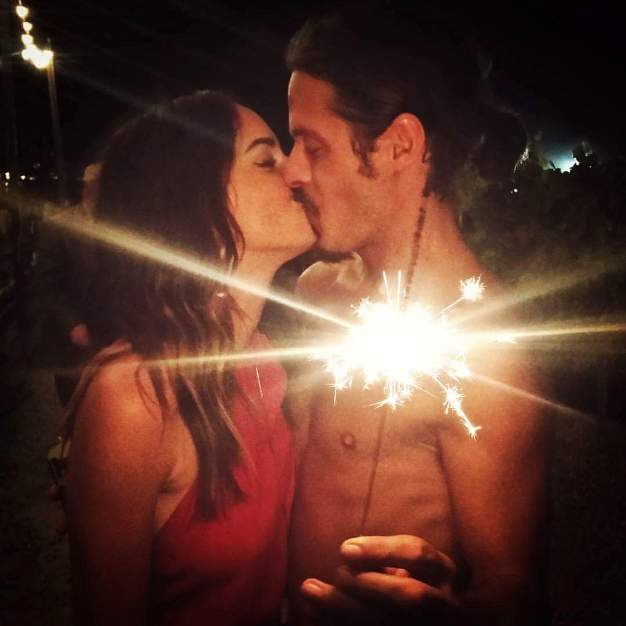
*Editor’s Note: Elephant Journal articles represent the personal views of the authors, and can not possibly reflect Elephant Journal as a whole. Disagree with an Op-Ed or opinion? We’re happy to share your experience here.
~
It’s too true to not be good.
Generation upon generation of men failing to whole-heartedly show up for women—as fathers, brothers, friends, and lovers—has necessitated a breed of “strong, independent women.”
These women have developed their own brand of armor out of necessity, as a survival instinct. Men, on the other hand, continue to grow more and more disconnected from their hearts, and are now relying on the heart-strength of their women to maintain relationships.
While obviously unhealthy, many women see this as their only option if they want romance in a world dominated by unawakened, and disconnected men.
Some turn to other women to meet their heart needs, while others give up on romance altogether, letting the juices in their hearts dry up.
I was one of those disconnected men—trying to show up for the women in my life, trying to love them with my whole heart. But, try as I might, I kept falling miserably short because my heart was fractured, fragmented and fearful.
Trial and error was getting me nowhere, so I dropped out of the relationship game and spent five years studying what a whole-hearted love looks like. I allowed my own heart to heal, and, once healed, to strengthen that atrophied muscle. And, once I was strong enough, I began dating again.
I brought my fully healed, open and vulnerable, emotionally-intelligent heart to the table.
This proved to be something foreign to the women I dated. It was a breath of fresh air to them, often seeming “too good to be true.” They would embrace the hell out of it…for a time. They would feel safe enough to remove that suit of armor, piece by piece.
Yet, there inevitably came a time, when that woman found herself stripped bare of all of her armor that kept her alive and safe all these years, and it terrified her. She would either flee immediately, or, little by little, put that armor, which she had previously grown so attached to, back on.
This devastated me.
“I have done the work,” I said, “so what is she running or hiding from?”
In the aftermath, I would feel devalued; as if all the work I put into tending my heart-garden, and all the nutrients I infused into my soul-soil, wasn’t enough.
We would separate and a few months later, she would contact me to say how much she had grown and learned how to maintain her openness with another man, and to thank me for my role in that.
This became a pattern that repeated itself over the course of three years. Each time, like déjà vu, I would find myself in a thunderstorm of tears and pain, crying out to the universe, “Why? Am I here simply to show women what a deeply-rooted love looks like—only for them to move on and live it with someone else? Is this my lot in life, to be nothing more than a rehabilitation center for the broken hearted?”
In these feelings of unworthiness, I would lose sight of the fact that this heart-withdrawal wasn’t about me. I failed to realize that the armor that those women had depended on to keep new harm out, had also been keeping a lot of old pain and trauma safe within.
The heart-opening that I made space for had a tendency to unearth a lot of buried wounds in them that demanded their full attention. So, after giving a me a glimpse into the throne room of their hearts, I found myself kicked out of the castle, watching the drawbridge rise. I didn’t know how to take this as anything other than rejection.
I had grown proficient at showing up for love, but I had no idea how to do so with a partner who wasn’t ready to show up in the same way. I would be so attached to the initial open heart that I saw, that I was unwilling to accept the slamming of the heart door. My response was to use my love as a battering ram on that closed door, which served only to push them farther into hiding.
Here I sit now, on the banks of the moat outside her castle gates, pondering how I can do this differently than I have in the past. Her heart may have retreated, but does that mean that mine has to? How do I stay and properly support her as she navigates the murky waters of her own heart?
I will love the sh*t out of her when she is open and even more so when she is closed, without love-bombing her walls in an attempt to love her into healing.
I will listen as she works through her internal healing without assaulting her with unsolicited advice.
I will maintain that safe space for her, standing firm, holding the door open to her, regardless of how often she walks in and out of it.
I will maintain a refuge for her to escape to if her demons begin to overwhelm her.
I will hold her hand as she walks through her own shadows, and when she slides her hand out of mine to go it alone, I will let her go with grace, knowing she will come back to me if and when she is ready.
I will wait patiently, without expectations, loving her as she is now, not as who I hope for her to become.
When she bends over to pick up the broken fragments of her heart, trying to piece it back together, I will offer a house of light, to guide her back to shore safely.
And when her distance sends me reeling, I will use that space to work in my own garden—
—because she is worth it.
Relephant:
,
Author: Jonathan Sherlock
Image: Courtesy of Author
Editor: Catherine Monkman


 Share on bsky
Share on bsky




Read 48 comments and reply